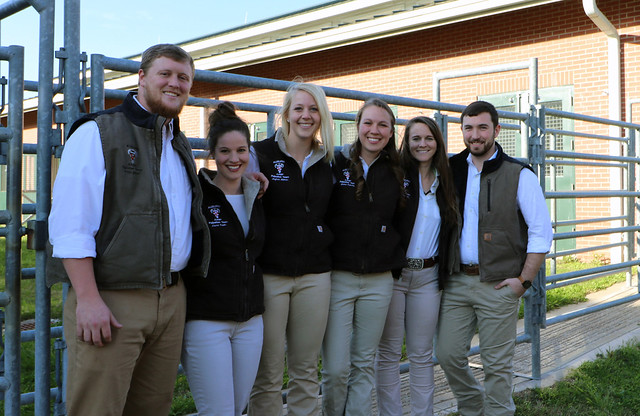Auburn veterinary students win national bovine palpation competition
Article body
Auburn University veterinary students won the national bovine palpation championship—consisting of pregnancy diagnosis and fetal aging in cattle—at the Student American Veterinary Medical Association's annual symposium at the University of Pennsylvania March 15-17.
"I'm just incredibly proud of them. They've worked extremely hard this past year, and their achievement is a great culmination of all their work," said Dr. Julie Gard, a professor in the College of Veterinary Medicine's Department of Clinical Sciences and the team's advisor and coach.
The team was one of 11 which competed in the national competition sponsored by the Society for Theriogenology. Since 2000, Auburn's teams have placed first in 11 symposiums, the most of any veterinary medical program.
The students on the 2018 Auburn palpation team are:
-
Laura Croom, Greenfield, Tennessee
-
Meghan Helmer, Union, Kentucky
-
Travis Sulfridge, Williamsburg, Kentucky
-
Emma Crowley, Danvers, Massachusetts
-
Isaac Jones, Centre, Alabama
-
Cecelia Chapman, Mount Pleasant, North Carolina
The competition is conducted in three sessions over three days: a written exam about palpation, a lab practicum where team test their fetal aging and pregnancy diagnosis skills. The top five teams moved on to the final judging of their palpation skills on a live cow.
Jones and Croom represented Auburn in the palpation portion of the competition. Croom tied for first place in the individual palpation contest. Sulfridge had the highest score on the written and tract portion combined and Emma Crowley was second. The team captain was Helmer.
"We wanted the championship as individuals and for our team, but we especially wanted to carry on the championship tradition for Auburn and for Dr. Gard," said Croom. "She is amazingly dedicated to helping us achieve our goal."
"We really worked together as a team and we brought different skills to use to get us to the final round," Crowley said.
"All the students were integral in winning the competition and we're proud of their accomplishment for the college and Auburn," Dr. Gard added.
Helmer said the competition was stiff, but that it started with their own classmates over a year ago and continued into the national competition. "As soon as the previous team completed the competition, we started practicing and dedicated ourselves to challenge each other.
"It was many early mornings and late nights and in addition to our classes and clinical work, we had to stay focused."
Auburn's winning team was assembled more than a year ago, through a stiff test competition at the college. The students have practiced as a team for a year, both as a group and individually.
To be a member of Auburn's team, students are required to take an elective course during their second year, "Advanced Large Animal Reproduction," instructed by Dr. Gard; be a member of the American Association of Bovine Practitioners; and have the top scores on a written exam.
All of the team members are in their third academic year of the veterinary program. These future veterinarians are an example of Auburn students being leaders though the principles of hard work, community outreach and significant health impact.
Auburn's College of Veterinary Medicine is internationally recognized for its theriogenology, or reproduction, program. The program was started with veterinarians like Dr. Robert Walker and Dr. Robert Hudson and carried on by Dr. Dwight Wolfe, Dr. Gatz Riddell and the late Dr. Bob Carson.
Auburn veterinary medicine continues the tradition of outstanding faculty with the current farm animal theriogenology faculty members: Dr. James Wenzel, Dr. Julie Gard, Dr. Misty Edmondson, Dr. Herris Maxwell and residents Dr. Jessica Rush and Dr. Humberto Nobre.
Related Media
Media interested in this story can contact Communications Director Preston Sparks at (334) 844-9999 or preston.sparks@auburn.edu.
The College of Veterinary Medicine is the South's original and nation's seventh oldest veterinary medical program, celebrating 126 years. We prepare individuals for careers of excellence in veterinary medicine, including private and public practice, industrial medicine, academics, and research. The college provides programs of instruction, research, outreach, and service that are in the best interests of the citizens of the state of Alabama, the region, the nation, and the world.





